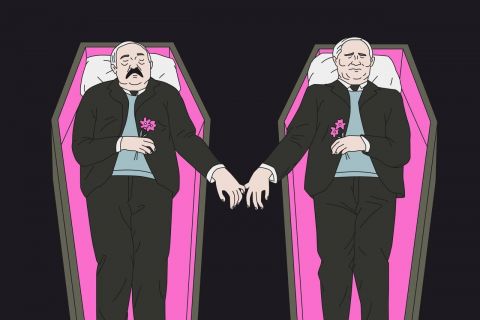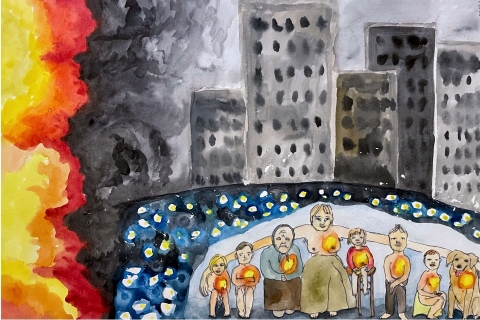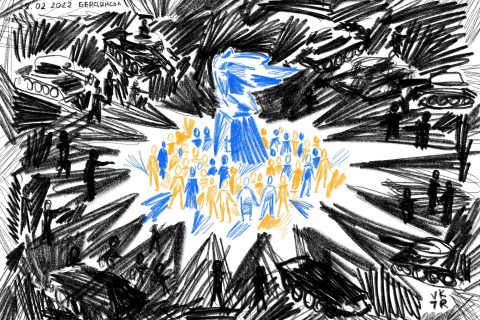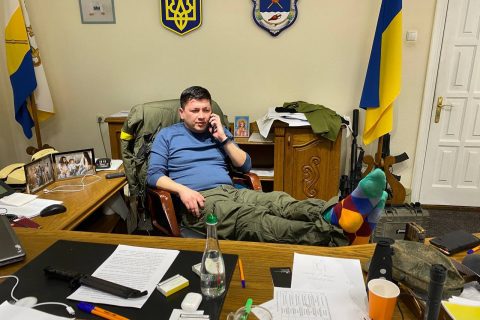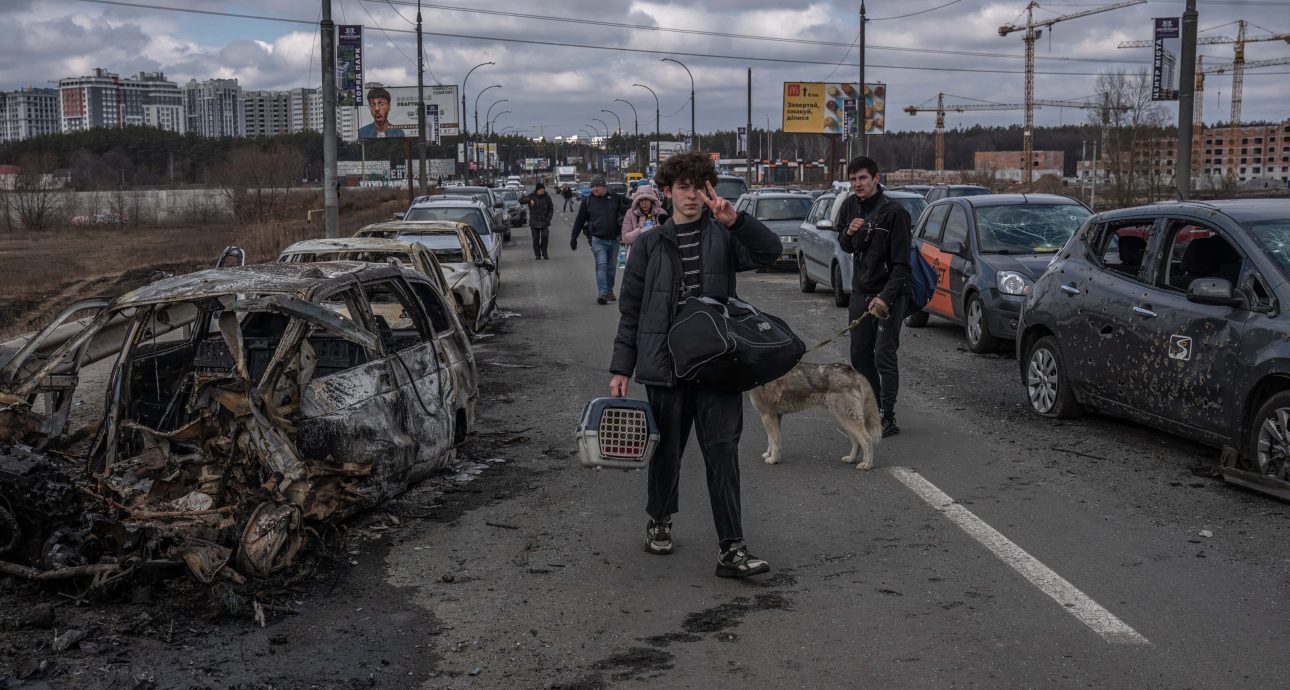
“My Son Was as Calm as a Veteran of the War in Afghanistan”: Evacuated Ukrainians on Surviving under Fire
Yevhenii Osiievskyi, Vorzel
I am a postgraduate student, and I have lived in a dorm in Vorzel for seven years. When it all began, I was in central Kyiv, and I hurried back to the dorm, where I spent a little over two weeks waiting for evacuation. I couldn’t believe till the last moment that this war would begin and that it would be this massive. Vorzel seemed like an ideal place to lay low at first. It’s a small town with mostly country houses. There’s even a sign at the city entrance: “Vorzel Resort”. As it turned out, the resort was strategically important.
There were 28 tenants in the dorm, and we took in four more people that came under shelling. We had no bomb shelter, so we joined forces and fortified shower rooms on the ground floor with sandbags. Granted, you get used to everything in time. On the first day, everyone ran down there at the sound of even distant explosions. Eventually, people stopped leaving their rooms even if the blasts were heard relatively close by. You do realize that it’s crazy, that it’s just apathy, and that you still need to go to the shelter because this way, you have a chance at surviving in case of a direct impact. However, it all numbs you down, and you just sit in your room thinking, “Perhaps, things will work themselves out this time, too.”
And they somehow do. Nobody was injured there, even though there were four impacts close to the dorm. Those were mortars, I believe. One landed about twenty metres from the entrance. So, we had been lucky to have only a few broken windows, while buildings 150 metres from us were hit by direct impacts.
We came together quite organically because of the kind of crowd we had there: they were mostly Kyiv Mohyla Academy fellows and displaced people from eastern Ukraine. Moreover, most people from the Kyiv Mohyla Academy were archaeologists, so field living was nothing new to them. We didn’t even discuss any schedule or assign responsibilities—everyone just started doing whatever they could to help. Admittedly, it wasn’t all sunshine and rainbows, and interactions within our crowd sometimes were not ideal, but self-organization and mutual support were very much real.
We didn’t even discuss any schedule or assign responsibilities—everyone just started doing whatever they could to help.
Having adapted myself a little, I even started reading books. The first few days were very hard, as windows kept trembling and opening from explosions, and it was nearly impossible to concentrate. A weird feeling: you have all the free time in the world but still can’t occupy yourself with anything.
We saw Russian convoys in our streets sometime into the second week. Before that, we only heard sounds of fighting nearby. The lights went out, and we kept reading the news as long as our connection lasted. However, I first saw in my window that our city was surrounded and only then read about it in the news. At least the invaders didn’t walk the streets or break into houses.
Setting up a routine helped me cope psychologically over the first few days. I did my job, bringing water from the well because running water was cut off. Also, without electricity, you gradually shift to waking up at sunrise and going to sleep after dusk. Even lighting up candles was not an option with the blackout measures in place. Therefore, I started reading during the day. When my e-ink reader died, I switched to paper books and comics I had accumulated in recent years. I was lucky to have had some excellent books there because a good book always brings you somewhere. It speaks to you, and it’s a great conversation to have. I also have two cats, which also helped me distract myself. However, what kept me sane most of the time was having some pace to my life.
I was lucky to have had some excellent books there because a good book always brings you somewhere and speaks to you.
Speaking of us as a collective, black humour was a great help, and there was a lot of it. Besides, most of the people being from the Kyiv-Mohyla Academy improved the situation. After all, if one of those stays somewhere with other people for a while, they start discussing the topics of their thesis or dissertation sooner or later. So, we sat down and listened to them talking about the Scythians, microbiology, and whatever. The dorm attendant stayed with us, too. She occupied herself with knitting most of the time.
After what I’ve been through, I think about how easy it is to end up in isolation. Come to think of it, Vorzel is just about 30 kilometres away from Kyiv. Usually, you have a lot of connections and feel like a part of the world, even if mainly because of the internet. And there, we lost electricity first, and, once we ran out of power banks, connection, too. When the evacuation began, we learned about it from other locals. People knew nothing for sure—according to hearsay, that evacuation could be organized by the Russians. Later, someone heard tell that it was Ukrainian side who organized it.
There is a big maternity hospital in Vorzel. We visited and tried to help because they had problems—there was no heating, and medications were running out. So, that maternity hospital was evacuated first, followed by women and older people. Other dorm tenants and I left Vorzel the following day.
Liubov, Hostomel
I lived in Kyiv, but my mother was in Hostomel. So, on the morning of the 24th of February, I packed up and went there to stay with her, no matter what happened next. There were difficulties with public transit from the very beginning, and there was no municipal transport whatsoever as early as on the second day. We have no car of our own. My mum did not take the threat seriously at first because nobody believed that things would unfold the way they have. And when serious fighting broke out near us, there was no chance to leave anymore. On the 27th of February, we lost internet, electricity, and running water, so we spent the following four days without any understanding of what was going on in the world around us. Then, the connection was finally restored, and we could talk with our relatives at least. I immediately started looking for ways of getting out, understanding that staying home was no longer an option.
We spent the following four days without any understanding of what was going on in the world around us.
We remained in our flat the entire time, not in the bomb shelter. It was a regular five-storey panel house, and, from what I’d read, their basements were even more dangerous. Besides, it was an emotionally challenging experience, and we felt calmer staying in our flat. Also, it wasn’t as cold there. Hearing the terrifying explosions, we hid in the bathroom. Also, we had some food stockpiled. We stored water wherever we could before it was cut but ran out of it quickly. Still, there was non-potable water in the building. The hardest thing was that we understood that it wouldn’t get any easier. At some point, tanks appeared right behind our windows.
My mum had a hard time accepting that we had to leave. It took about two days to persuade her. I had to look for exit routes because the bridges in the direction of Kyiv were destroyed, and my friends couldn’t get us out. Also, that would be outright dangerous, with the Russian troops shooting at cars on sight. My friends in Hostomel couldn’t help either because they lived even closer to the airport, and their situation was even worse. I contacted a volunteer, who agreed to meet us on the road near the crumbling bridge. However, she couldn’t get there, and we had to reach her on foot.
One day, fighting started on our very street, basically behind our windows, so the glass broke. At that moment, we finally decided we couldn’t stay there anymore because we would be buried under the rubble if the house got hit. We took our things, put our cat in the pet carrier, and set off across the field to the checkpoint beyond the bridge. The people there helped us get to Kyiv, where our friends met us and brought us to the railway station.
The scariest thing was to cross that field. Explosions resounded around us, shells were whizzing past, the glass plant behind us caught fire, and there was a massive plume of smoke above it. We made our way past mines. In fact, we were so lucky to survive. It’s as if I found myself in a Remarque’s book about the people who took to forests and swamps to flee the war.
Explosions resounded around us, shells were whizzing past, the glass plant behind us caught fire, and there was a massive plume of smoke above it. It’s as if I were in a Remarque’s book.
We decided to leave, realizing that we couldn’t lead a normal life at home anymore, even if the house itself survived. There was no heating or running water there anyway. So, when the connection came back and we learned about what was happening in the nearby cities, we decided to take our chance. Being able to talk to our friends helped a lot, too. Also, we were inspired by the position of our country leadership, who stayed calm and kept saying that everything was alright, that we would win, and that they knew what they were doing. If there were even a bit of doubt in their words, it would be much harder for everyone.
Dmytro Tereshkov, Irpin
My family and I took refuge in an underground parking of a new housing development in Irpin. We went there at once because we heard explosions and saw warplanes and helicopters flying above on the very first day, and it all scared my daughter. Sometime later, my parents joined us there. The fact that we hid under a cast-in-place concrete frame building was reassuring. There were about 130 people with us and a lot of cars. At least, the children didn’t have to stay in a damp, cramped basement. Still, it was rather cold there, so we had to sleep clothed and with our caps and scarfs on. We didn’t have a car at first, but our friends later brought their car there, and we started spending nights in it.
When people were asked to turn off the lights everywhere, we had to take a screwdriver and go from storey to storey, having no access to the master switch. In time, the explosions drew closer and became louder, so we stopped going out, although we did understand that we might remain there for many days or even weeks. Sometime later, Kyivstar stopped working, and we decided to go out and buy some other mobile operator’s SIM cards and restock on food. Our internet access was thus restored, and we could follow the news again. That was how we knew that enemy saboteurs were in the city and saw the destroyed tanks in the outskirts of Irpin.
The situation was getting worse, people started evacuating from the parking, and we looked for ways to leave, too. An American church nearby kept in touch with the Territorial Defence Force and helped people leave the city when things were calm. Our first attempt was unsuccessful, though—our convoy had to make a U-turn because of the fighting that began nearby. Nobody could accompany us the following day, with the enemy forces said to be around the city. Still, we realized that it might be our only chance, and we had to leave immediately. So, we evacuated together with our parents and my sister’s family. For that, we had to take the car of our neighbour who managed to leave earlier. I didn’t even have my driver’s licence on me, but nobody asked for it, given the war.
Now I remember that everyone ran to shelter whenever there was an explosion in the first days. Toward the end of our stay, we could go outdoors and have a cigarette even during a Grad shelling nearby. Soon, we could even discern whether it was anti-aircraft defence or Grad firing and whether we were shelled or it was the sound of our defense. It was a relief not to hear it again when we finally left because even children could tell what kind of explosions they heard by then. My daughter is ten. She reacted strongly at first but soon got used to it. Meanwhile, my son—he is fourteen—was as calm as a veteran of the War in Afghanistan and even calmed down those who panicked. Mind you, when the war broke out, he was in the hospital, where he got antibiotic injections and was under the drip. He was quickly discharged, though. We continued the treatment with pills in the shelter, and he successfully recovered.
Soon, we could even discern whether it was anti-aircraft defence or Grad firing and whether we were shelled or it was the sound of our defence.
Frankly, children surprised us a lot—a reaction like that was hard to predict. Their biggest problem was the lack of usual routine and having to live in such conditions. Naturally, they asked questions about the war. They were interested in how far the enemy could go and soon started looking up the information on the internet. Seeing the photos of destroyed buildings, kids understood how far the enemy could go and realized that we stayed in the shelter for a reason. Overall, adults panicked more than they did.
People at the parking didn’t talk much, but everyone offered whatever help they could, food, warm clothes, to warm up in the car, and more. My wife had a tooth removed the day before, and there were some complications, so my sister had to remove stitches with nail scissors—and she did just fine. Everyone was anxious all the time and kept discussing the news. I played the guitar a few times, and we sang the Ukrainian anthem together. Anything else just didn’t feel right. After all, it was not camping near the fire, so the anthem felt the most appropriate in that situation.
I played the guitar a few times, and we sang the Ukrainian anthem together. Anything else just didn’t feel right.
Being connected to the internet helped a lot, too. In many cities where there is none, people get disinformed by rumours that Kyiv has fallen and all that stuff. However, you shouldn’t get immersed in this storm of information. I mean, you need to read the news wisely. You should not believe everything you read or react to it. Often, news stories tell about the destroyed columns of 300 tanks, and then you look at the photos, and there are hardly five of them there. In hindsight, it hardly changes anything—enemy tanks are still there, but a big figure like 300 can stir your emotions.
Also, we survived because we stuck together as a family, and all the decisions were made collectively. We often discussed evacuation, but every time someone stopped the rest, and for a good reason, as it turned out. As a result, we left at the right time.
Anastasiia, Bucha
My dad was 99% sure that the war was coming three weeks before it broke out. Think about it, he said, perhaps you’d want to leave while there are still flights. I thought that I didn’t want to. After all, I have a flat here, a cat, and stuff.
In the very first days, I saw explosions near the Hostomel airfield in my window. On day three or four, I was legit scared: Bucha came under shelling, and I had to spend the night in the basement for the first time. There had been no electricity in my block of flats since then. An extended curfew was imposed that weekend, and I couldn’t leave. I spent about three hours on the balcony because a column of Russian tanks was gathering under my windows. While my phone worked and there was an internet connection, I photographed everything and sent the pictures to the Territorial Defence Force, informing them which tank went where. When the phone’s battery died, I just went to bed. I quickly learned to sleep amid explosions—they became something akin to white noise.
While my phone worked and there was an internet connection, I photographed everything and sent the pictures to the Territorial Defence Force, informing them which tank went where.
My dad picked me up the following day because they had electricity and running water. I was used to living alone. As much as I love my parents, I started thinking about evacuating almost immediately, I believe, because I just couldn’t stand being 24/7 with them. I had little understanding of how I might leave, because the bridges were blown up and I had no car. However, once a tank starts driving literally in your yard, you kinda realize that you must do something.
Nothing was sold in our city from day one. I mean, the shop opened, and the food was taken out and distributed among people, each taking what they needed. I was lucky to get a Life SIM card because Kyivstar stopped working. In some instances, though, I had to stand near the shop with a crowd behind me and shout, asking them to bring me tampons. The owner of a small household shop damaged by looters called our residential complex himself, asking people to come and take whatever they needed before someone else did it. It’s a strange feeling when money becomes irrelevant and gets replaced by bartering.
While there was still no official information on evacuation from Bucha, the people I know said I needed to get to the checkpoint between Bucha and Irpin, and a man would take me to the bridge in Romanivka, and then I will have to cross it on foot and go further. I was scared to trust a complete stranger because I had heard a lot about Russian convoys using civilians as living shields. Still, I decided to give it a shot.
My dad and I left for the first time on the 3d of March, I believe. I took my cat. The moment we reached the house nearby, bullets started whistling past us, and we had to go back. The man I had to meet confirmed that there was fighting on the road. We tried to evacuate again the following morning, after I learned trains were departing from Irpin. I left the cat home, and dad took the bike and gave me a lift. Jet fighters were flying above us; bullets started swishing again; we heard explosions all around but decided that we had to get there somehow. My dad likes to take his time to consider things, but once he decides on something, he is quick to take action. He has always said that I am process-driven, and he is result-driven.
He wasn’t permitted to join me on the platform, because only women and children were evacuated, so I had to wait for my train alone for over three hours. All this time, dad was waiting for me to leave in Irpin, and then the city came under heavy fire. He had to spend a night in some bomb shelter because he couldn’t make it home before the curfew. The following day, when he returned to Bucha, dad saw that a shell had hit the tenth storey of their block of flats. Mum had to spend the night in the garage, and he stayed to put the fire out because municipal services were down.
The neighbours who lived in the flat below us tried to get away in their car. On their way to the checkpoint near Irpin, they came under fire. My parents said their neighbour’s body was still lying on the road with eight more near it, when they were leaving Bucha on the 11th of March.
At that point, nobody in the city had electricity, gas, or heating. People were cooking outdoors on charcoal grills. Mum said she didn’t want to drink ice-cold water and that blankets didn’t help. Good thing that there were diesel generators in the residential complex where I lived, and dad had where to charge his phone. So yeah, this is how it is: for some time, you have doubts if you want to leave everything behind, even though you realize that you can’t help with anything. At first, you don’t want to leave your home, but nothing holds you there when it turns into a cold dark box.
At first, you don’t want to leave your home, but nothing holds you there when it turns into a cold dark box.
In general, people could leave the city, but they didn’t know who controlled which areas and where it was safer for them. My parents learned about everything from our Territorial Defence Force soldiers at the checkpoint. My mum has a disability—she walks with two canes—and then my parents had to traverse the bridge with their things and two cats. However, mum said she managed to do it, as adrenaline was pumping and soldiers helped a lot. She said that the faster all locals get evacuated, the sooner the Russians will be mopped up there.
Diana Berg, Mariupol
An activist, cultural personality, and the founder of the TU (ТЮ!) artistic platform in Mariupol. Moved to Mariupol from Donetsk.
We were in the middle of preparing another episode of our art project’s residency and anticipated two artists to arrive on the 24th of February to work with our teenagers. So my first thought was, “Do I have to cancel it?” A part of our team left over the first few days of the war, and I stayed with my family because nobody believed it would turn out like this. We wanted to stay home, didn’t want to flee again. It took me about a year to collect myself after Donetsk; it finally started feeling like home there. And it’s hard to tell how much time I will need this time. It all depends on how it all ends.
It began gradually. On the first day, there was some shelling; on the second—small arms fire was heard; and on the third—shops stopped accepting bank cards, the city came under heavy shelling, first airstrikes happened, and so on. When we left on the eighth day, everything was engulfed in flames. We spent three days in the blockade.
I didn’t understand it was time to leave until the very last moment. Rather, I wanted to see if it was possible to leave at all and whether the city was surrounded or not. On our first try, we encountered a sabotage-and-reconnaissance group and came under fire. Therefore, we had to stay. However, there was no electricity, heating, running water, or cellular connection. It was so hard to live in an informational vacuum. We volunteered as much as we could, fitting out bomb shelters. Before the electricity went out, we worked with the Informational Warfare Force; I published posts and filmed videos. However, explosions grew closer, and we realized we had to try and get out.
I didn’t understand it was time to leave until the very last moment. Rather, I wanted to see if it was possible to leave at all and whether the city was surrounded or not.
We spent our last night in the city in a volunteer centre, where six of us kneaded the dough by hand because the generator could power only lights but not the kneading machine. It was terrifying. At 6 PM, we were in total darkness, and something kept exploding nearby. At 4 AM, we woke up, got into our car, and set out to leave the city. It was an experiment born out of absolute despair and panic. However, it was even more terrifying to stay, even though we were lucky to have stockpiled some food and water. At the time, I thought it was hell, but now I understand that our living conditions were relatively OK.
We planned to come back for others if we made it through, but we couldn’t return. We even had to leave our two cats in Mariupol. We have been unable to contact our families for over a week already.
We passed the enemy checkpoint because soldiers there were distracted by other cars—someone had a dashcam turned on there. Then we encountered an entire column of military equipment and managed to make it between two tanks while one of them was trying to aim in our direction.
We reached Zaporizhzhia, then Dnipro, and were shocked that there was petrol there, and traffic regulations were still observed. In Mariupol, traffic lights didn’t work, naturally. It seemed that we had survived the impossible. However, when I met the people who evacuated a mere day after us, I realized that our journey was relatively normal—they had to drive among dead bodies and under the Grad shelling.
The informational vacuum was the hardest thing because there was no way to let anyone know that you were alive or even learn what was going on. Now, I get messages about every 30 minutes asking if I know what could happen to some people living at certain addresses in Mariupol. If someone has a cellular connection, they are certainly not there, and I wouldn’t be able to find out anyway, even if I were there. We tried to organize a bus from Dnipro and even got it included in an evacuation convoy, but there has been no “green corridor” thus far.
I get messages about every 30 minutes asking if I know what could happen to some people living at certain addresses in Mariupol.
People have to survive among ruins there. The central part of the city has been destroyed; there is no one there to put out the flames even. The sky is open, and bombs keep being dropped. Despite all odds, though, the city endures. The Azov (a unit of the National Guard of Ukraine—translator’s note), police, and volunteers are fighting to the death.
There, I was overcome with panic and fear. Now, I feel guilty and powerless because there is nothing I can do to help. While most people who left the city suffer from trauma and can’t speak about it, I am trying to spread the word and do interviews whenever I can. Hopefully, it helps one way or another. Speaking out has become my duty now.
Cover photo: Erik Marmor
New and best
